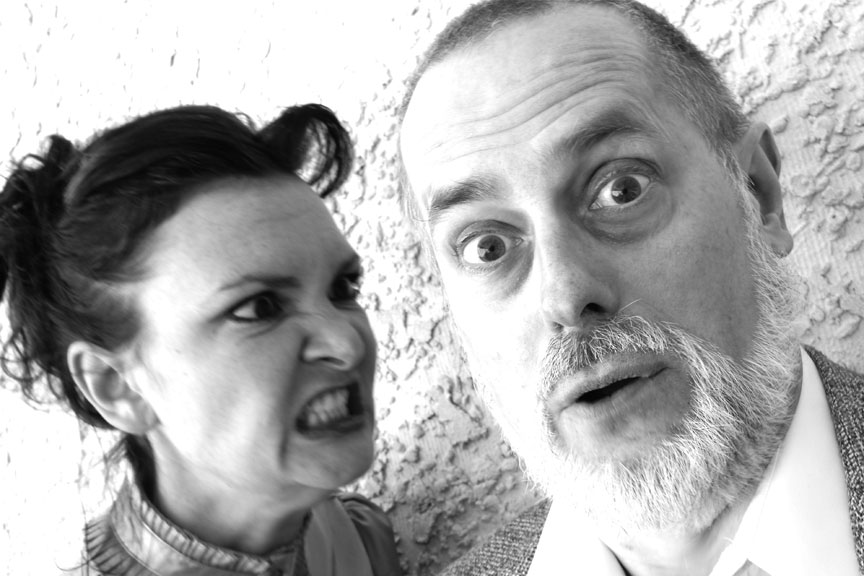The Serious Business of “My Fair Lady”
Quinton Skinner reviews Ten Thousand Things' stripped-down production of the classic musical, "My Fair Lady." This version, he says, gets at the heart of "the damned serious business" of a desperate girl on society's margins who dares to dream for more.


DURING THE INTERMISSION OF LAST FRIDAY’S PERFORMANCE of Ten Thousand Things‘ (TTT) My Fair Lady, an audience member offered up an enthusiastic endorsement of the production’s intensity and emotional power. The odd part was that, after a bit of prodding, he admitted to never having seen a TTT show before. The lack of a set, the queasy fluorescent lighting: weren’t these elements jarring? His reply was a look of befuddlement; it simply hadn’t occurred to him to feel cheated by a lack of conventional stagecraft.
Performed by four actors and an orchestra of one (Peter Vitale, on keyboards, percussion, and a good deal of what-have-you), this production of My Fair Lady, more often than not, manages to make amnesiacs of viewers who associate the musical with lavish sets, costumes, and a full orchestra. It’s difficult to imagine a company other than Ten Thousand Things managing the feat of stripping Lerner and Loewe’s iconic story to its often-bitter essence, and it’s a sterling example of the trade-offs and leaps of faith that the company regularly embodies.
Ten Thousand Things doesn’t tamper with the story: Eliza (Kate Eifrig) is a lower-class London flower girl who chances upon linguistic specialist and haughty prig Henry Higgins (Steve Hendrickson). In this pivotal meeting, Eifrig is base and guttural to the point of near-incomprehensibility; Hendrickson plays his character as superior, self-satisfied, and in no way sympathetic. My Fair Lady has always been a story about class and gender, but here we see it rendered with little nicety. Eifrig’s eyes flash with desperation, the cold calculation of the poor looking for anything: a coin, a better situation, a way out. When Eliza enters into a deal with Henry, who aims to civilize her through elocution, it is not a sweet arrangement. Eifrig plays her character as always on the verge of a rage, hyper-sensitive to being the object of sport, and terribly frustrated with Henry’s torrent of condescension.
We are treated to any number of famous tunes, but they’re delivered in minimal tones. Eifrig and Hendrickson are passable singers, but Bradley Greenwald (as Eliza’s suitor, Freddy, and Henry’s maid, Ms. Pearce) is the only first-rate voice in the cast. Viewed from a certain angle, it’s undeniable that this is a liability in the production. It might well be worth asking why TTT should tackle this show in the first place: why deconstruct My Fair Lady, of all things?
The answer is found in the hidden textures of the piece, which in this production are brought into stark contrast, and in the company’s underlying mission. To put it bluntly, there’s a sense that, while paying middle-class audiences are welcome to attend and enjoy this show, it was imagined and conceived only partly with them in mind (and with a minority share of the consideration). The intended audience, as always for TTT, consists of those for whom theater is at best a rare and uncommon experience: the incarcerated, the needy, the elderly.
TTT is rightly lauded for serving these audiences, but this production, in particular, requires an unpacking of the company’s philosophy. Just about everyone agrees that the company puts on good shows, and that director Michelle Hensley has a unique vision (although Lear deBessonet directs, this time out), but connecting the service element of TTT to the work it produces is informative to the art form itself.
______________________________________________________
The secret is a crucial perspective that underpins every Ten Thousand Things show: respect, and faith. Theater can indeed be considered ennobling, but this company assumes that its audience is vested with ample inherent nobility; their faith is placed in the greatness of theater itself.
______________________________________________________
The secret, it seems, is a crucial perspective that underpins every TTT show: respect, and faith. It would be tempting to go into a correctional institution, put on a show, and make any number of bad-faith choices: condescension, easy programming, pandering. TTT takes the opposite tack, bringing world-class theater to largely uneducated audiences, fueled by a respect for their viewers’ innate human apparatus to apprehend art’s messages. Theater can indeed be considered ennobling, but TTT assumes that its audience is vested with ample inherent nobility.
In terms of faith, TTT places its own in the greatness of theater itself. There aren’t many companies who could program My Fair Lady and Little Shop of Horrors alongside Shakespeare and Beckett, and such an act requires a fundamental faith that good art transcends genre and intellectual or critical reputation; Lorca can be stripped down just as well as Lerner and Loewe, given solid direction, assured performers, and a vision that encompasses stories told from the perspectives of the unfortunate, those on a run of bad luck, or the dispossessed.
In the hands of Ten Thousand Things, this isn’t the telling of a story about the witty and urbane, if charmingly clueless Henry Higgins and the pretty lump of clay he molds to demonstrate the thin façade of social class. It’s the tale of a desperate girl who dares to dream of more, who knows acutely how shaky is the ground under her feet, who knows that she is a plaything in a world of forces stacked against her. Eliza’s search for dignity underpins every production of My Fair Lady, but here that quest is not whimsical, or plucky. It is a damned serious business, and intended primarily for audiences who know how fragile the balance of a life is, and how capriciously it can be thrown off track.
So, when Eifrig’s Eliza ushers the men in her life out the metaphorical door, offering up her sweetest and most open smile of the night, we find ourselves relaxing for the first time. Eliza had lots of help from Henry, yes, but in standing up straight and facing life on her own terms, she provides the final push. It is fairly astonishing, the degree to which one is rooting for her.
______________________________________________________
Related performance details:
Ten Thousand Things’ production of My Fair Lady by Alan Jay Lerner and Frederick Loewe, directed by Lear deBessonet, music by Peter Vitale, with Kate Eifrig, Steve Hendrickson, Bradley Greenwald, Kimberly Richardson, and Luverne Seifert; the musical is on stage at the Minnesota Opera Center in Minneapolis through May 30.
______________________________________________________
About the author: Quinton Skinner is the author of the novels 14 Degrees Below Zero and Amnesia Nights, as well as non-fiction books on music and parenting. He has written extensively on Twin Cities theater in local and national publications. He lives in Minneapolis.